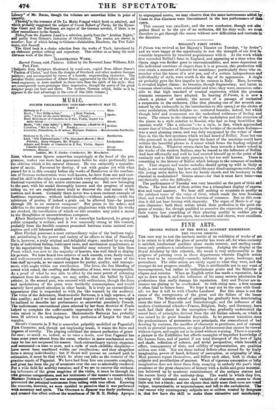Itur.LINI'S FIRST OPERA.
Il Pirate was revived at her Majesty's Theatre on Tuesday, "by desirew; and we were happy at the opportunity to test the strength of our first fa- vourable impression by renewed acquaintance with it. As the work which first extended Bellini's fame in England, and appearing at a time when the Opera stage was farther gone in conventionalities, and more dependent on the individual exertions of singers than it is at present, this production will ever retain a measure of interest for musicians; particularly those who re- member what the traces of a new pen, and of a certain independence and individuality of style, were worth in the day of its appearance. A single air probably gave the first impulse to its success in Italy. Here, however, it revealed higher claims: its beauties, though fragmentary, and latent to common observation, were substantial and true; they were, moreover, refer- able to that high standard of musical expression which the greatest dramatic composers have adopted. In hearing II Pirates, it is now a chord, a phrase of melody, the accent of a passage of recitative! a suspension in the orchestra, (like that pleasing one of the seventh sus- tained by the violoncello in the introduction to this opera,) or the choice of some modulation, which delights us: scattered beauties, indeed, but which though brief and evanescent are the undoubted evidences of feeling and taste. The return in the character of the modulation and the structure of the pieces to a style anterior to Rossini, who had so long bestridden the operatic world "like a colossus "—to a style, in fact, which approached nearer that of Gluck and Mozart than to the levities of the modern Italians— was a most pleasing omen, and was duly recognized by the writer of these lines in this the first specimen which we had heard of Bellini. None but one who possessed in an eminent degree the heart of the musician could have written the beautiful phrase in A minor which forms the leading subject of the first finale. Whatever return there has been towards a better school in the works of the modem Italians, may be traced to the influence of Bellini. And how effectually and well he had exerted himself up to the point of his . untimely end to fulfil his early promise, is but too well known. There is something in the history of Bellini which belongs to the romance of modem.. art. That elegant and tender melodies should spring up wild in Sicily or . Italy, is not surprising; but how, amid the most disadvantageous culture,did this young artist derive his love for heroic chords and his tendency to tlm classical in modulation? Genius alone—for that it must have been—can satisfactorily solve the difficulty. The performance of Tuesday was very beautiful on the part of Grisi and- Maria The first duet of these artists was a triumphant display of express; *ion and vocal mastery. We hear still nothing so exquisite in quality ea the subdued tones of the voice of Grisi, which reach the true feminine, ideal, and would befit the loveliest heroine of romance. But on this occa- non it did not bear forcing with impunity. The organ of Mario is of cog- nate character: both these artists attain their perfection in the quiet de- , gance of music; for, though qualified. to conceive the expression of passion, their voices lose something of their pleasing quality in sudden jets of sound. The details of the opera, the orchestra and chorus, were excellent.


























 Previous page
Previous page